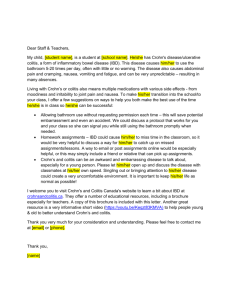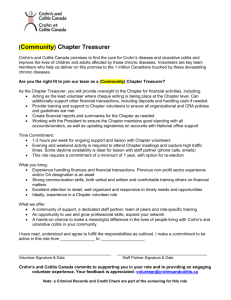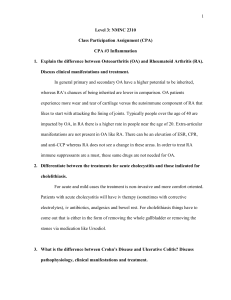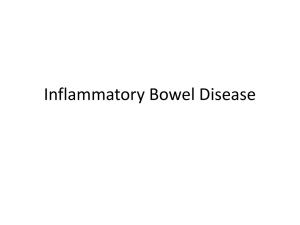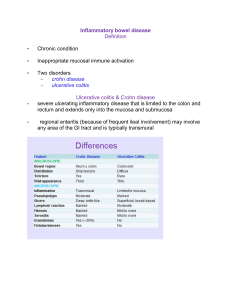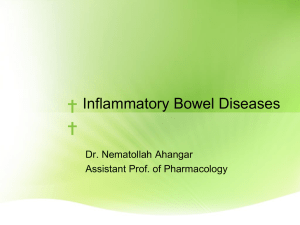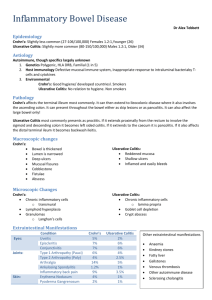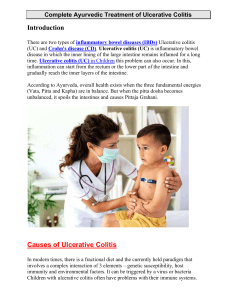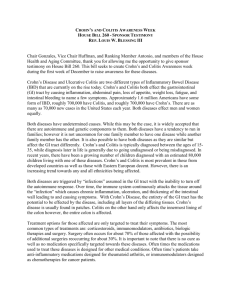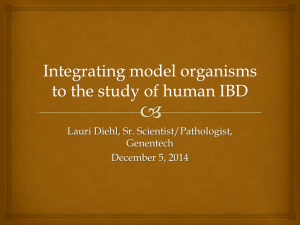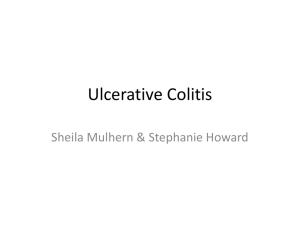Here
advertisement
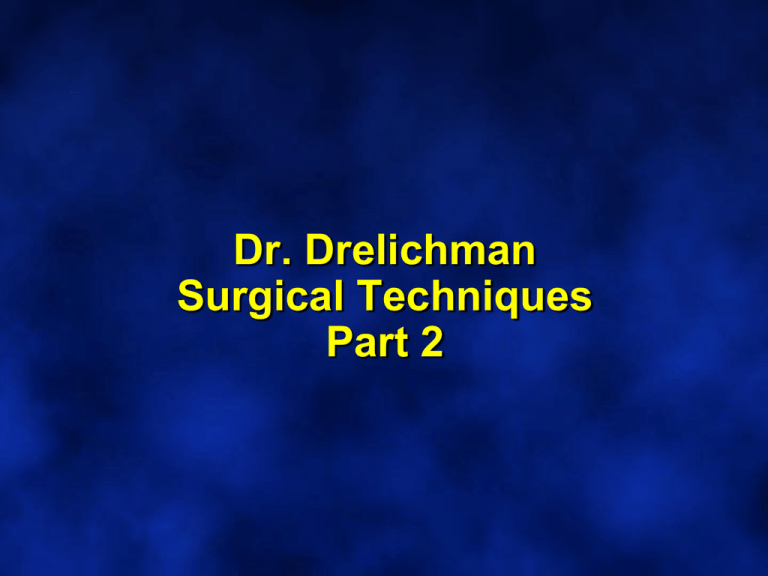
Dr. Drelichman Surgical Techniques Part 2 Crohn’s Disease Laparoscopic Colectomy - Results: Patient Outcomes LAP (n=33) OPEN (n=33) Median (range) Median (range) 0 (0-4) 3.0 (2-8) 0.0001 Days to regular diet 2.0 (1-6) 5.0 (3-12) 0.0001 # Shifts of narcotics 6.0 (2-14) 10.0 (3-34) 0.0010 Length of stay (days) 4.0 (2-8) 7.0 (3-14) 0.0001 Days to clear liquids Conversion Rate 5.9% p-value Laparoscopy for Ileocolic Crohns Prospective Randomized Trial 60 pts Ileo-colic Crohn’s Disease • Results: Incision Morphine bowel function LOS Complications Milsom et al. DCR 2001;44:1-9: Lap Open 5cm = 3.0d 5d 4 12cm = 3.3d 6d 8 Multiple strictures Strictures & Sacculations Bowel Sparing techniques Strictureplasty for Crohn’s Disease STRICTUROPLASTY (FINNEY) Jaboulay Strictureplasty Indication: long stricture Judd Strictureplasty Indication: fistula site Crohn’s Conclusions • Bowel-conserving surgical options strictureplasty and limited resection • Complication rates are similar in both • Reoperation rates are 50% at 10 years, and 70% at 15 years Crohn’s Disease Conclusion • Absolute Indications for Surgery • Relative Indications _ QOL • Laparoscopy has some benefits • Disease related challenges • Specialized Medical & Surgical care • Close Collaboration Surgery for Ulcerative Colitis ANATOMIC EXTENT OF ULCERATIVE COLITIS ENDOSCOPIC SPECTRUM OF SEVERITY Ulcerative Colitis Symptoms/Signs • Bright red blood per rectum and diarrhea are the most common symptoms • Severe disease may evoke crampy abdominal pain and distention*, fever, tachycardia, elevated WBC • Extraintestinal symptoms in up to 36% of patients * Toxic megacolon: acute colitis with segmental or total dilation of the colon and accompanying fever, abd pain and tenderness, tachycardia, and leukocytosis RISK OF COLORECTAL CANCER Surveillance • Colonoscopy should begin at 8-10 years duration of disease • Then at 1-2 year intervals • Pts with PSC start surveillance at time PSC diagnosed Eaden J et al. Gastrointestinal Endoscopy 2000 SURVEILLANCE BIOPSY PROTOCOL PSEUDOPOLYPS DALMS IN ULCERATIVE COLITIS Risk of Cancer associated with Dysplasia • Review of ten prospective studies Probability of cancer • DALM 43% • HGD 42% • LGD 19% Bernstein et al. Lancet 1994 INDICATIONS FOR SURGERY IN ULCERATIVE COLITIS Ulcerative Colitis Indications for Surgery • Intractability • Massive hemorrhage • Toxic megacolon • Fulminant acute colitis • Systemic complications • Cancer or dysplasia • Growth retardation (in children) IBD - Toxic Megacolon Surgical Options • Colectomy/Rectal preservation, Ileostomy: • Ulcerative colitis - 3-stage pouch • Crohns - 2-stage IRA SURGICAL OPTIONS IN ULCERATIVE COLITIS IPAA Maintains the normal route of defecation Increased frequency of stools Avoids permanent ostomy Functional Outcomes 1,454 patients IPAA for CUC. 12 yrs f/u • <45 >45 • Stool Freq • Day 6 6 • Night 1 2 • Incontinence • Never 43% 24% • Occ.(2/wk) 48% 59% • Freq 9% 17% Farouk R, Pemberton JH, Wolff BG, Dozois R. Annals Surg. 2000 Quality of Life Patients with UC report a lower quality of life compared to healthy individuals Score similarly to patient with other chronic illness (Diabetes) Muir et al. Am J Gastroent. 2001 Post IPAA Quality of Life Preoperative scores low in all scales Health status questionnaire scores improved and even equal general population at 1 year. Thirlby, R et al. Archives of Surg 2001 Post IPAA Quality of Life Ulcerative Colitis Conclusions • Risk Cancer increases with time in patients with UC and CC • Surveillance Regimen to prevent Ca • Colectomy should be offered to patients with Dysplasia Ulcerative Colitis Conclusions • Surgery offers definitive cure UC • 1/3 of patients with UC have surgery • Post Colectomy Patients have good QOL • J-Pouch requires Surgical Expertise Build Your Team • Be Proactive • Be Educated • What % of practice IBD • Post Graduate training • Build your Team • Coach or Project manager • IBD specialist, Surgeon • Nutrition • Social and Spiritual Support • Communicate St. John Health System IBD Center Contact Information Office: (248) 849-6030 Fax: (248)849-6039 Kim Buck, NP: (248)849-5448 “I don’t know where it goes, and I don’t want to know”
